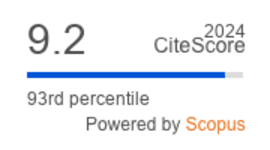DNA Methylation: Its Role and Interaction with Epigenetic Modifications in Cancer
DOI:
https://doi.org/10.36877/pmmb.a0000458Abstract
DNA methylation is an epigenetic mark involving the addition of a methyl group to DNA, particularly at cytosine residues. This methylation plays an important role in regulating gene expression through direct gene repression or through the control of other epigenetic modifications such as histone modification or chromatin remodeling. DNA methylation is catalyzed by de novo and maintenance DNMT methyltransferase type enzymes and requires the transfer of a methyl group to cytosine to transform it into 5-methyl-cytosine. Currently, several investigations have highlighted the involvement of aberrant DNA methylation with certain tumors. Indeed, the methylation of antioncogenes and/or the demethylation of oncogenes are the major alterations that are strongly linked to human cancers. DNMTs play a central role in the epigenetic regulation of the human genome, both in normal and pathological processes. Recent discoveries on the differentiated roles of DNMTs in DNA methylation, and their implication in various cancers, open the way to new therapeutic approaches targeting these enzymes to treat epigenetic diseases. It is essential to continue exploring the roles of DNMTs to better understand their implication in tumorigenesis mechanisms and to develop more effective treatment strategies.
Downloads
Published
How to Cite
Issue
Section
License
Copyright (c) 2025 Nasreddine El Omari, Saad Bakrim, Mohamed Bakha, Abdelaali Balahbib, Abdelhakim Bouyahya, Chrismawan Ardianto, Long Chiau Ming, Hooi Leng Ser

This work is licensed under a Creative Commons Attribution-NonCommercial 4.0 International License.
Author(s) shall retain the copyright of their work and grant the Journal/Publisher right for the first publication with the work simultaneously licensed under:
Creative Commons Attribution-NonCommercial 4.0 International (CC BY-NC 4.0). This license allows for the copying, distribution and transmission of the work, provided the correct attribution of the original creator is stated. Adaptation and remixing are also permitted.

This broad license intends to facilitate free access to, as well as the unrestricted reuse of, original works of all types for non-commercial purposes.
The author(s) permits HH Publisher to publish this article that has not been submitted elsewhere.



.png)

.jpg)
